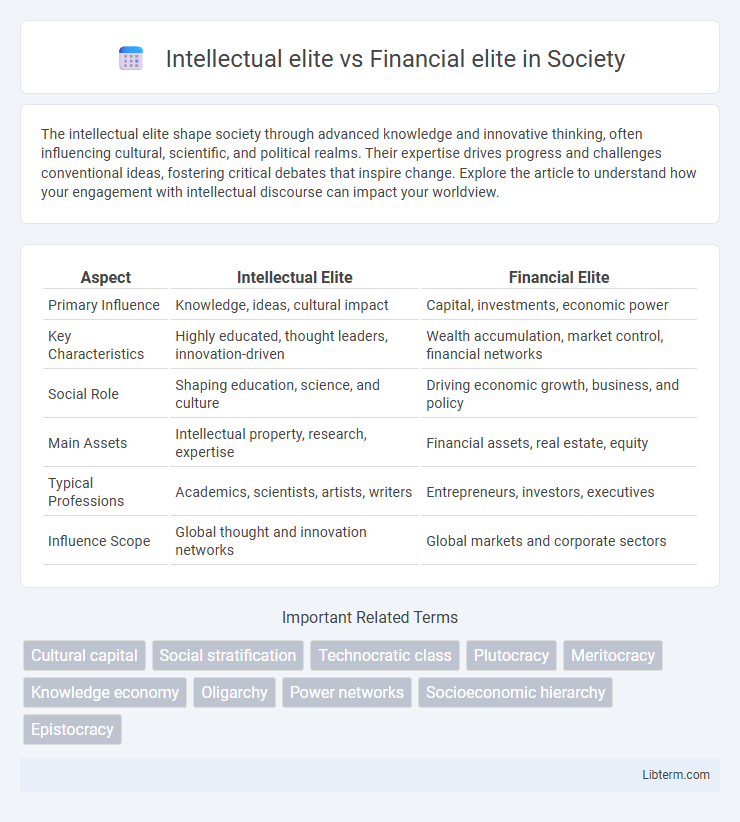The intellectual elite shape society through advanced knowledge and innovative thinking, often influencing cultural, scientific, and political realms. Their expertise drives progress and challenges conventional ideas, fostering critical debates that inspire change. Explore the article to understand how your engagement with intellectual discourse can impact your worldview.
Table of Comparison
| Aspect | Intellectual Elite | Financial Elite |
|---|---|---|
| Primary Influence | Knowledge, ideas, cultural impact | Capital, investments, economic power |
| Key Characteristics | Highly educated, thought leaders, innovation-driven | Wealth accumulation, market control, financial networks |
| Social Role | Shaping education, science, and culture | Driving economic growth, business, and policy |
| Main Assets | Intellectual property, research, expertise | Financial assets, real estate, equity |
| Typical Professions | Academics, scientists, artists, writers | Entrepreneurs, investors, executives |
| Influence Scope | Global thought and innovation networks | Global markets and corporate sectors |
Defining the Intellectual Elite
The intellectual elite comprises individuals recognized for their advanced expertise, critical thinking, and contributions to knowledge across fields such as academia, science, and the arts. Unlike the financial elite, whose influence primarily arises from wealth accumulation and economic power, the intellectual elite shape societal progress through innovation, cultural leadership, and thought leadership. Their defining attributes include education credentials, published research, and intellectual influence in shaping public discourse and policy.
Who Are the Financial Elite?
The financial elite consist of individuals and families who hold significant wealth through assets such as stocks, real estate, and business ownership, often controlling major financial institutions and investment firms. This group influences global markets and economic policies by leveraging capital power, frequently shaping corporate governance and financial regulations. Their wealth-based authority contrasts with the intellectual elite, who primarily derive influence from knowledge, innovation, and expertise in academic or scientific fields.
Historical Roots of Both Elites
The intellectual elite traces its historical roots to ancient academies and medieval universities where scholars specialized in philosophy, science, and arts, shaping cultural and scientific progress. Financial elites emerged prominently during the Renaissance and Industrial Revolution, accumulating wealth through trade, banking, and industrial capitalism, thus influencing economic and political power structures. Both elites have historically maintained distinct spheres of influence, with intellectual elites driving knowledge and ideology, while financial elites control capital and material resources.
Paths to Power: Knowledge vs Wealth
The intellectual elite gain power primarily through expertise, education, and innovation, shaping societal values and policies by influencing public discourse and decision-making processes. In contrast, the financial elite amass power by controlling capital, investments, and economic resources, enabling them to steer markets and political agendas in their favor. Both paths to power--knowledge and wealth--intersect but often prioritize different mechanisms of influence and control within social hierarchies.
Influence in Modern Society
Intellectual elites shape modern society through thought leadership, innovation, and cultural influence, driving advancements in science, technology, education, and policy-making. Financial elites exert power by controlling capital flows, investments, and economic resources, significantly impacting markets, political decisions, and social structures. The interplay between intellectual and financial elites determines the direction of societal progress and governance in contemporary times.
Overlap and Distinctions
The intellectual elite, comprising top academics, scientists, and cultural leaders, often influence societal values and knowledge production, while the financial elite, including wealthy investors and corporate executives, wield power through capital and economic control. Overlaps occur when intellectual leaders leverage financial resources to fund research or when wealthy elites invest in education and innovation sectors. Distinctions lie in their core bases of influence: intellectual elites shape ideas and cultural capital, whereas financial elites drive economic policies and market dynamics.
Social Perceptions and Stereotypes
The intellectual elite are often perceived as knowledgeable, principled, and driven by ideas, while the financial elite are stereotyped as powerful, materialistic, and focused on wealth accumulation. Social perceptions tend to valorize intellectual elites for their contributions to culture and innovation, whereas financial elites are viewed with suspicion due to associations with economic inequality and influence over politics. These contrasting stereotypes shape public attitudes, with intellectual elites seen as morally superior and financial elites as pragmatic but sometimes ethically ambiguous.
Impact on Policy and Governance
The intellectual elite shapes policy and governance by providing expertise, research, and innovative ideas that inform decision-making and long-term strategic planning. The financial elite influences policy through lobbying, campaign financing, and economic leverage, often prioritizing regulatory environments conducive to capital accumulation. The interplay between these elites affects governance outcomes, balancing evidence-based policy with economic interests and power dynamics.
Globalization and Changing Elites
The intellectual elite, characterized by their expertise in knowledge production and innovation, shapes global discourse and policy in the era of globalization, influencing cultural, scientific, and technological advancements. In contrast, the financial elite control capital flows, investment strategies, and international markets, driving economic globalization and wealth accumulation across borders. The dynamic interplay between these elites redefines power structures, with changing elites navigating complex global networks to maintain influence amid shifting geopolitical and economic landscapes.
The Future of Elite Dominance
Intellectual elites, defined by advanced knowledge and innovation, will increasingly drive technological progress and culture shaping, while financial elites, characterized by vast capital and asset control, will maintain dominance through investment and economic influence. The future of elite dominance hinges on the convergence of intellect and wealth, where interdisciplinary expertise and capital allocation determine power hierarchies. Emerging trends in AI, biotechnology, and global finance suggest a hybrid elite class will shape policy and societal norms more effectively than either group alone.
Intellectual elite Infographic

 libterm.com
libterm.com